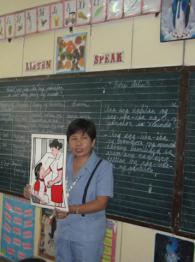
About the Project
This project is one of the 2010 WISE Awards finalists.
The Center for Prevention and Treatment of Child Sexual Abuse (CPTCSA) aims to eradicate child sexual abuse. To prevent the sexual abuse of children the project includes all stakeholders and tackles each of the many individual components that combine to hurt children (social, cultural, religious, physical, emotional, environmental, economic, effects of globalization, to name a few). The Philippines is a country with vast human resources yet severely limited public resources. The project has been able to bring together donors and stakeholders, mostly nongovernmental, to pilot research- and indigenous-based ideas and then revise materials and methodologies until it can reach the many populations in the country. As an NGO network, it is better able to be creative and even fail in its work as it learns. The government does not have that option with its limited public resources. CPTCSA-piloted materials are then turned over to the government with continued support from CPTCSA, including sourcing funding. Those from the government who act as advisers throughout the process become leaders in the training and ongoing policy development process to create safe, holistic schools. In 2009, the Department of Education passed a law that mandates all schools to use the materials developed by CPTCSA and its consortium.
Context and Issue
CPTCSA creates tools to teach life skills that focus on child protection. These materials must be able to be used in any educational format – formal, non-formal, alternative, home schooling or social group work. The issues include relevant laws/rules, age-appropriate sex education that begins with the vocabulary for private body parts for preschool and moves on to dating violence in high school, communication and feelings vocabulary, assertiveness, helping words, recognizing dangerous situations, the affirmation of rights and appropriate responsibility for children and adults, appropriate blame placed on the offender, and how to get help and from whom.
Education and learning are negatively impacted by abuse. The Philippines is a country with long experience of political conflict and annual natural disasters, during which times the vulnerability of children to abuse is increased. Conflicts increase the responsibility of the teachers and schools and thus their need for increased ability and support to protect children
The Solution and Impact
The Center for Prevention and Treatment of Child Sexual Abuse (CPTCSA) is a nongovernmental organization that can pilot as many creative and innovative methods as possible and then link successes with government services that do not have the flexibility or ability to learn from failures.
The project’s most obvious impact is the increase in reporting abuse to medical and legal systems. However, what is not so readily observable is the quality of communication between teachers and their students, as well as the quality of healthy relationships between children and their parents. The sexual behavior of boys has also come to the forefront of discussion and services.
Future Developments
Current and future developments include the launch of an academic journal to stimulate indigenous research for the project to better understand the components and elements of Philippine society and culture. The aim is to help identify what makes children vulnerable and what strengths exist to protect children in the future. This research will empower social workers and teachers to take part in the ongoing revision of all services that focus on child protection.
In terms of future developments, CPTCSA continues to build relationships with universities. In addition, it has begun its own Learning Institute to transfer research-based learning using traditional classroom-style teaching as well as experimenting with sessions online and through Skype.


